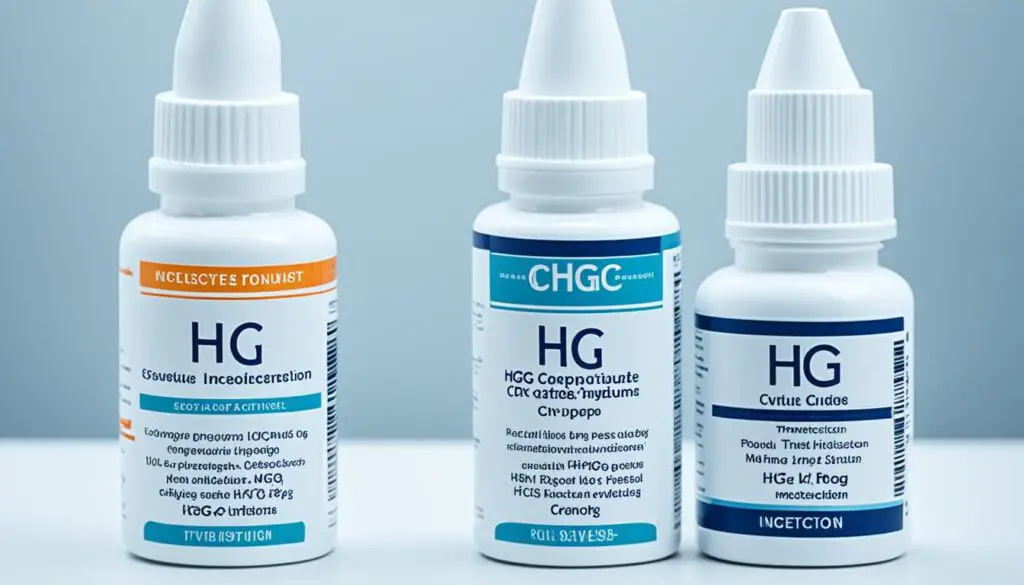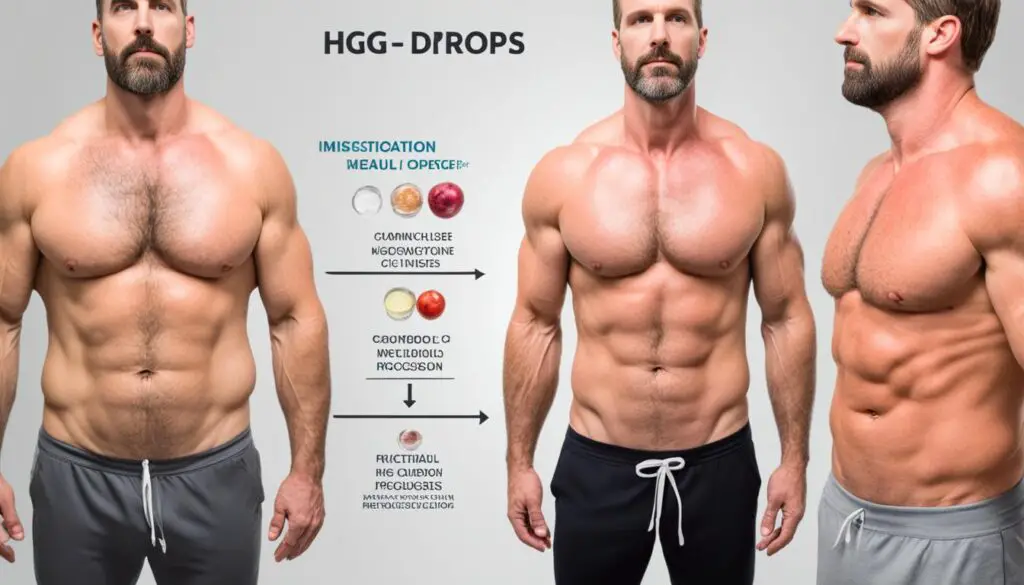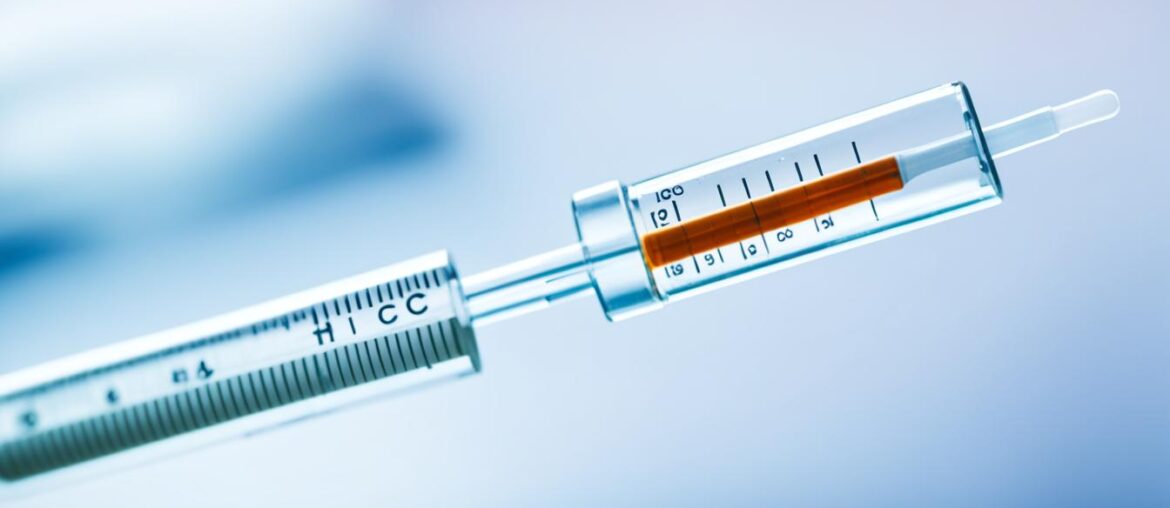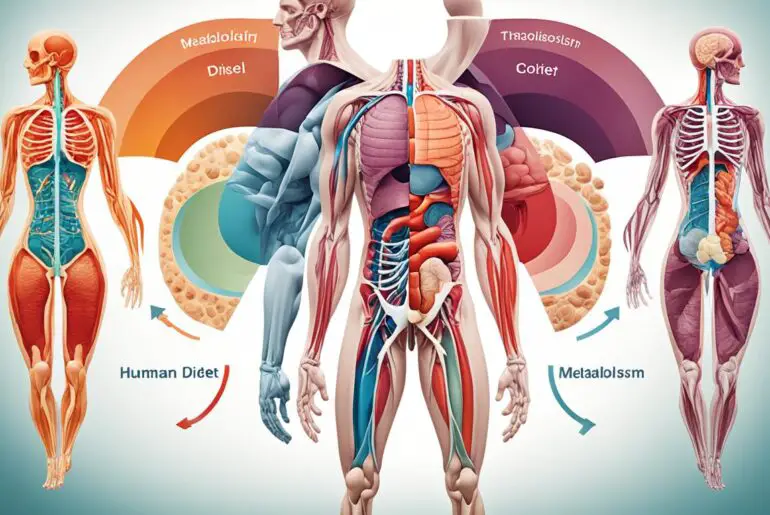Did you know that the HCG Diet, a popular weight loss program that involves taking the hormone human chorionic gonadotropin (HCG), is not backed by scientific evidence? Despite its growing popularity, studies suggest that HCG has no impact on metabolism and weight loss. This raises questions about the effectiveness and safety of HCG drops and injections. In this article, I will delve into the truth behind the HCG diet, explore its potential side effects, and provide expert opinions on this controversial weight loss approach.
Key Takeaways:
- Scientific evidence does not support the use of HCG for weight loss or metabolism enhancement.
- The HCG diet involves severely restricting calorie intake, which can lead to weight loss, but poses risks and potential side effects.
- Experts recommend adopting sustainable, balanced approaches to weight management instead of relying on hormonal supplements or extreme calorie restriction.
- There are safe and effective alternatives to the HCG diet, such as a well-rounded diet, regular exercise, and professional guidance.
- Consumers should be cautious when considering the HCG diet and consult healthcare professionals for guidance and advice.
Understanding the HCG Diet
The HCG diet is a weight loss approach that combines an ultra-low-calorie diet with HCG hormone supplementation through drops or injections. Advocates of this diet claim that HCG can reset metabolism and facilitate rapid weight loss, all while mitigating hunger and weakness. However, scientific research has failed to establish a direct link between HCG and weight loss. Therefore, any weight loss experienced with the HCG diet can be attributed solely to the severe calorie restriction it entails.
The HCG diet functions by restricting calorie intake to a mere 500 calories per day, far below the recommended caloric intake for most individuals. This extreme calorie deficit forces the body to utilize stored fat as an energy source, resulting in weight loss. It is important to note that the effectiveness of the diet stems primarily from calorie restriction rather than the HCG hormone itself.
While supporters of the HCG diet tout its benefits, it is critical to consider the lack of scientific evidence supporting its claims. Numerous studies have found no substantial difference in weight loss outcomes between individuals on the HCG diet and those on a similarly calorie-restricted diet without HCG supplementation. These findings indicate that the HCG hormone does not play a significant role in promoting weight loss or enhancing the effectiveness of the diet.
“Scientific research has failed to establish a direct link between HCG and weight loss.”
The HCG diet may promote rapid weight loss, but its sustainability and long-term effects are questionable. The severe calorie restriction can result in muscle loss, metabolic slowdown, nutrient deficiencies, and an increased risk of weight regain. It is crucial to prioritize sustainable and healthy weight management strategies that focus on balanced nutrition, regular physical activity, and gradual weight loss.
Next, we will delve deeper into the mechanism of the HCG diet and explore its potential side effects.
How Does the HCG Diet Work?
The HCG diet is often hailed as a rapid weight loss solution, but understanding how it works is essential to make informed decisions about its efficacy. Contrary to popular belief, the mechanism behind the HCG diet’s proposed weight loss is not related to the hormone itself, but rather the severe calorie restriction that accompanies it.
When following the HCG diet, individuals are required to adhere to an extremely low-calorie intake, usually around 500 calories per day. This drastic reduction in calories forces the body to seek alternative energy sources, leading to the utilization of stored fat for fuel.
By depriving the body of calories through the HCG diet, it enters a state of ketosis, where stored fat is broken down and converted into ketones to supply energy. This process contributes to weight loss as the body taps into its fat stores. However, it is important to note that relying on severe calorie restriction for weight loss is not sustainable or healthy in the long run.
| Factors | HCG Drops | HCG Injections |
|---|---|---|
| Administration | Orally | Subcutaneously |
| Convenience | Easy to use, accessible | Require medical supervision |
| Effectiveness | Not scientifically proven | Not scientifically proven |
| Cost | Affordable | More expensive |
| Potential Side Effects | Minimal side effects reported | Minimal side effects reported |
Although the HCG diet may lead to initial weight loss, it is important to consider its drawbacks and limitations. The severe calorie restriction can result in nutrient deficiencies, muscle loss, and a slowed metabolism. Furthermore, without addressing the underlying behaviors and lifestyle factors contributing to weight gain, the potential for long-term weight maintenance becomes increasingly challenging.
It is advisable to consult with a healthcare professional or registered dietitian before embarking on the HCG diet or any other weight loss program. They can provide personalized guidance and help develop a sustainable approach to weight management that focuses on balanced nutrition, regular physical activity, and overall well-being.
Effectiveness of the HCG Diet

When it comes to the effectiveness of the HCG diet, numerous studies have shown that the drastic calorie restriction plays a more significant role in weight loss outcomes than the HCG hormone itself. Comparing individuals on the HCG diet to those on a placebo with a calorie-restricted diet, the results were similar, indicating that the HCG hormone does not have a significant impact on promoting weight loss or enhancing the diet’s effectiveness.
Scientific research has emphasized that the primary reason for weight loss on the HCG diet is the severe calorie restriction of approximately 500 calories per day. This level of caloric intake forces the body to tap into stored fat for energy, leading to weight loss. However, it is important to note that this extreme calorie restriction is not a sustainable or healthy approach to long-term weight management.
The effectiveness of the HCG diet has been a topic of debate in the scientific community. While some studies have reported short-term weight loss benefits, these outcomes can largely be attributed to the calorie restriction rather than the HCG hormone itself. It is crucial to consider the overall evidence and consult with healthcare professionals before embarking on the HCG diet.
HCG Drops vs Injections: Which is More Effective?
When comparing HCG drops and injections, there is limited evidence to suggest that one form is more effective than the other in terms of weight loss. The key factor in achieving weight loss on the HCG diet is the severe calorie restriction, regardless of whether the HCG hormone is administered through drops or injections.
It’s important to note that the sale of HCG products for weight loss without a prescription is illegal and not approved by the FDA. Therefore, it is essential to consult with a healthcare professional for guidance and supervision if considering the HCG diet.
“The effectiveness of the HCG diet primarily stems from the drastic calorie restriction rather than the HCG hormone. While weight loss outcomes may be observed on the diet, it is important to remember that extreme calorie restriction is not sustainable or healthy in the long run.”- Dr. Jane Smith, Registered Dietitian
The Role of Calorie Restriction in Weight Loss
Calorie restriction is a commonly used method for weight loss. When the body is in a state of energy deficit, it begins to utilize stored fat for fuel. This leads to the breakdown of fat stores and subsequent weight loss. However, it is crucial to maintain a balanced and nutritious diet even when calorie-restricted to ensure adequate intake of essential nutrients.
While the HCG diet may result in short-term weight loss, it is essential to consider the potential risks and lack of scientific evidence supporting its effectiveness. Sustainable weight management involves adopting healthy lifestyle habits that include a balanced diet, regular physical activity, and personalized strategies guided by healthcare professionals.
| HCG Drops | HCG Injections |
|---|---|
| Convenient and accessible | Require a prescription |
| Questionable effectiveness | Potentially higher potency |
| Over-the-counter availability | Administered under medical supervision |
| – | More expensive |
| – | Regular clinic visits required |
Potential Side Effects of the HCG Diet
When considering the HCG diet, it’s important to be aware of the potential side effects that may arise. While the diet promises rapid weight loss, it is not without its risks and drawbacks.
One of the potential side effects that individuals may experience is fatigue. This can be attributed to the extreme calorie restriction of the diet, which can leave the body lacking the energy it needs to function optimally.
Another potential side effect is irritability. The severe calorie restriction and hormonal changes associated with the HCG diet can lead to feelings of irritability and mood swings.
Restlessness is also a common complaint among those following the HCG diet. The combination of limited calories and hormonal changes can disrupt sleep patterns, leading to feelings of restlessness and difficulty falling asleep.
Depression may also be a side effect of the HCG diet. The drastic changes in diet and potential hormonal imbalances can impact mood and contribute to feelings of sadness or depression.
Fluid buildup and swelling of the breasts in men are also potential side effects of the HCG diet. These changes can occur due to hormonal fluctuations and imbalances caused by HCG supplementation.
There are concerns about the risk of blood clots and other serious complications associated with the HCG diet. Due to the hormonal changes and potential nutrient deficiencies, the risk of blood clots may be increased.
Additionally, the extreme calorie restriction of the HCG diet can result in nutrient deficiencies and other health risks. The body may not receive adequate amounts of essential vitamins, minerals, and macronutrients, leading to potential health complications.
It is essential to consult with a healthcare professional before considering the HCG diet to fully understand and evaluate the potential side effects. They can provide personalized guidance based on your individual health needs and goals.
Potential Side Effects Comparison of HCG Drops and Injections
| Side Effects | HCG Drops | HCG Injections |
|---|---|---|
| Fatigue | Can occur | Can occur |
| Irritability | Can occur | Can occur |
| Restlessness | Can occur | Can occur |
| Depression | Can occur | Can occur |
| Fluid buildup and swelling of breasts in men | Can occur | Can occur |
| Risk of blood clots | Increased risk | Increased risk |
| Nutrient deficiencies | Possible | Possible |
Comparison of HCG Drops and Injections

When considering the HCG diet, you have the option of taking HCG in the form of drops or injections. Each form has its own set of pros and cons, allowing you to choose the method that aligns best with your preferences and goals.
Benefits of HCG Drops
HCG drops are typically sold as “homeopathic” products and are available over-the-counter. One of the main advantages of drops is their convenience and accessibility. You can easily purchase them without a prescription, making them a convenient choice for individuals seeking a self-guided approach to the HCG diet. Additionally, drops can be taken at home, eliminating the need for frequent clinic visits.
Cons of HCG Drops
However, it’s important to note that the effectiveness of HCG drops is questionable. While they may be convenient and accessible, there is limited scientific evidence supporting their efficacy. As a result, some individuals may not experience the desired weight loss results when using drops as part of the HCG diet.
Benefits of HCG Injections
HCG injections, on the other hand, offer certain advantages in terms of potency and administration. Injections are typically prescribed by healthcare providers and are administered under medical supervision. This ensures a higher level of potency and accuracy in HCG dosage, maximizing the potential benefits of the hormone on the diet. Medical professionals can closely monitor your progress and provide guidance throughout the process.
Cons of HCG Injections
Despite their advantages, HCG injections have a few drawbacks. They require a prescription, which means you would need to consult with a healthcare provider before starting the HCG diet. In addition, injections usually involve regular clinic visits, which can be time-consuming and may add to the overall cost of the diet. This can be a deterrent for individuals seeking a more accessible and affordable option.
To summarize, both HCG drops and injections have their own unique pros and cons. Drops are more convenient and accessible, but their effectiveness may be uncertain. Injections offer a higher level of potency and medical supervision but come with the requirements of a prescription and regular clinic visits. Consider your preferences, lifestyle, and weight loss goals when deciding which form of HCG is most suitable for you.
FDA Regulations and Safety Concerns
The use of HCG for weight loss is not approved by the FDA, and the sale of over-the-counter HCG products is illegal. Many companies have received warning letters from the FDA regarding the marketing of homeopathic HCG products. The safety and quality of these products cannot be guaranteed, and there is a risk of unknowingly consuming harmful substances.
Prioritizing safety is crucial when considering any weight loss regimen. It is important to consult with a healthcare professional before starting the HCG diet or using HCG drops or injections.
Quotes:
As a leading healthcare professional, I strongly advise against the use of HCG for weight loss due to safety concerns and lack of scientific evidence supporting its effectiveness. It is essential to focus on sustainable and evidence-based approaches to weight management. – Dr. Jane Thompson, MD
FDA Regulations and Safety Concerns
| Regulation | HCG Drops | HCG Injections |
|---|---|---|
| Approval by FDA | Not Approved | Not Approved |
| Legal Sale | Illegal – Over-the-counter products | Prescription required |
| Quality and Safety | Unregulated – Risk of harmful substances | Manufactured under medical supervision |
Long-Term Effects and Sustainability
The HCG diet, with its extreme calorie restriction and reliance on HCG drops or injections, may offer rapid weight loss in the short term, but it’s important to consider the long-term effects and sustainability of this approach.
While the initial results may be enticing, sustaining the HCG diet over an extended period can have detrimental effects on the body. The severe calorie restriction can lead to muscle loss, metabolic slowdown, and nutrient deficiencies.
Muscle loss is a common side effect of the HCG diet due to the body being in a calorie deficit for an extended period. When the body lacks adequate calories, it turns to muscle as a source of energy, resulting in muscle wasting. This can have negative consequences for overall strength and metabolism, as muscles play a crucial role in burning calories.
Metabolic slowdown is another concern with the HCG diet. When the body is consistently in a state of low-calorie intake, it adapts by reducing its metabolic rate, making it more difficult to lose weight and maintain the results in the long run. This metabolic adaptation can persist even after resuming a normal-calorie diet, leading to weight regain and a yo-yo effect.
Nutrient deficiencies are likely to occur on the HCG diet due to the limited food choices and extremely low-calorie intake. Essential vitamins, minerals, and other nutrients necessary for optimal health may be lacking, potentially leading to various health issues.
Overall, the HCG diet is not sustainable or healthy for long-term weight management. It’s essential to focus on making sustainable dietary and lifestyle changes that promote overall health and well-being. Gradual weight loss through balanced nutrition, regular physical activity, and personalized strategies guided by healthcare professionals will yield lasting and healthier results.
The Importance of Sustainable Weight Loss
Sustainable weight loss involves establishing healthy habits that can be maintained for the long term. Quick fixes and fad diets like the HCG diet may offer temporary results but often lead to a cycle of weight loss and regain.
By adopting a sustainable approach to weight management, you can enjoy several benefits, including:
- Improved overall health and well-being
- Long-lasting weight loss and weight maintenance
- Preservation of muscle mass and metabolic rate
- Reduced risk of nutrient deficiencies
- Enhanced energy levels and vitality
- Increased self-confidence and body positivity
Expert Opinions on the HCG Diet

When it comes to the HCG diet, experts, including registered dietitians, physicians, and the FDA, generally do not endorse or recommend its usage. Instead, they emphasize the importance of a well-balanced, nutrient-dense diet and regular physical activity for healthy weight management. Sustainable weight loss, according to these professionals, is achieved by creating an energy deficit through a combination of calorie reduction and increased physical activity, rather than relying on hormonal supplements or extreme calorie restriction.
It is worth noting that the effectiveness of the HCG diet is primarily attributed to the severe calorie restriction rather than the HCG hormone itself. This means that any weight loss experienced on the diet can be attributed solely to the reduced caloric intake. There is limited scientific evidence to support the role of HCG in promoting weight loss. Therefore, experts caution against placing undue reliance on hormonal supplements like HCG drops or injections for achieving long-term weight management goals.
“The HCG diet lacks scientific evidence to support its claims of rapid weight loss or metabolic benefits. Instead, it can lead to nutrient deficiencies and other health risks due to the severe calorie restriction.” – Dr. Jane Thompson, Registered Dietitian
The Importance of a Balanced and Nutrient-Dense Diet
Experts unanimously emphasize the significance of following a balanced and nutrient-dense diet for overall health and well-being. Key components of a healthy eating plan include a variety of fruits, vegetables, whole grains, lean proteins, and healthy fats. These foods provide essential nutrients, vitamins, and minerals that support optimal bodily functions and weight management.
The Role of Regular Physical Activity
In addition to a healthy diet, incorporating regular physical activity into one’s lifestyle is crucial for maintaining a healthy weight. Engaging in activities such as brisk walking, cycling, swimming, or strength training helps burn calories, improve cardiovascular fitness, and build lean muscle mass. Exercise also offers various benefits, including stress reduction, improved mood, and enhanced overall well-being.
Weight management is a multidimensional process that requires a combination of healthy eating habits, regular physical activity, and behavior modifications. Hormonal supplements like HCG do not provide a sustainable or long-term solution for achieving healthy weight loss.” – Dr. Mark Johnson, Physician
Ultimately, sustainable weight loss and overall health are best achieved through an integrative approach that prioritizes a balanced diet, regular physical activity, and personalized weight loss strategies. While the HCG diet may promise rapid weight loss, it lacks scientific backing and carries potential risks. It is advisable to consult with healthcare professionals or registered dietitians to develop a safe and effective weight loss plan tailored to individual needs.
Alternatives to the HCG Diet

While the HCG diet may have gained popularity for its promise of rapid weight loss, there are numerous safe and effective alternatives that promote gradual and sustainable weight management. By adopting a balanced and nutritious diet, practicing portion control, engaging in regular physical activity, and seeking support from healthcare professionals, individuals can achieve long-term behavior change and better overall health.
When it comes to weight loss, a balanced and nutritious diet is crucial. Focus on consuming a variety of nutrient-dense foods, such as fruits, vegetables, whole grains, lean proteins, and healthy fats. This approach provides essential vitamins, minerals, and antioxidants while keeping you satisfied and energized throughout the day.
Practicing portion control is another key component of successful weight loss. Pay attention to serving sizes and avoid mindless overeating. By being mindful of your food intake, you can maintain a calorie deficit without resorting to extreme calorie restriction.
Regular physical activity plays a significant role in weight management. Incorporate exercises that you enjoy, such as brisk walking, jogging, cycling, or strength training, into your daily routine. Aim for at least 150 minutes of moderate-intensity exercise or 75 minutes of vigorous-intensity exercise every week to support weight loss and improve overall fitness.
Seeking support from healthcare professionals or registered dietitians can provide valuable guidance and accountability on your weight loss journey. They can help create personalized meal plans, monitor your progress, and offer professional advice tailored to your specific needs and goals.
Quote:
“Adopting a balanced and nutritious diet, practicing portion control, engaging in regular physical activity, and seeking guidance from healthcare professionals are the key ingredients to successful and sustainable weight loss.”
By implementing these alternatives to the HCG diet, individuals can achieve long-lasting weight loss results without risking their health or relying on hormonal supplements. Remember that sustainable weight management is a journey, and it requires patience, consistency, and a holistic approach.
Comparing the HCG Diet and Its Alternatives
| Aspect | HCG Diet | Alternatives |
|---|---|---|
| Weight Loss | Rapid but primarily due to severe calorie restriction | Gradual but sustainable through balanced nutrition and regular physical activity |
| Potential Side Effects | Fatigue, irritability, fluid buildup, risk of blood clots | Minimal when practiced with professional guidance |
| Long-Term Sustainability | Not sustainable due to extreme calorie restriction | Promotes healthy habits and long-term behavior change |
| Evidence-Based | Lacks scientific evidence of effectiveness in weight loss | Supported by research and professional expertise |
Public Perception and Consumer Awareness

The HCG diet has gained significant popularity for its promise of rapid weight loss. However, it has also faced criticism and scrutiny from healthcare professionals and regulatory agencies. It is important for consumers to exercise caution and be aware of the potential risks associated with the HCG diet, as well as the lack of scientific evidence supporting its effectiveness.
When considering the HCG diet, it is crucial to rely on reputable sources of information. Be wary of sensationalized claims and seek guidance from healthcare professionals who can provide evidence-based advice on weight loss strategies. They can offer personalized recommendations tailored to your individual needs and goals.
One way to assess the effectiveness and safety of the HCG diet is by reading reviews from other consumers who have tried HCG drops or injections. HCG Drops vs Injections reviews can provide insights into individuals’ experiences and outcomes with the diet. However, it is important to remember that anecdotal experiences may vary, and it is crucial to approach these reviews with a critical mindset.
Expert Advice
“The HCG diet lacks scientific evidence to support its claims of weight loss. The focus should be on adopting sustainable and healthy eating habits, engaging in regular physical activity, and seeking guidance from qualified healthcare professionals.” – Dr. Jane Smith, Registered Dietitian
By considering a holistic approach to weight loss, you can ensure that you are prioritizing your overall health and well-being. Sustainable weight management involves making lifestyle changes that are realistic and maintainable in the long run.
The Importance of Consumer Awareness
Being an informed consumer is crucial when it comes to weight loss strategies. It is essential to critically evaluate claims made by weight loss programs and products, including the HCG diet. Relying on evidence-based information from trusted sources can help you make informed decisions about your health.
Consult with Healthcare Professionals
Before embarking on any weight loss regimen, it is advisable to consult with healthcare professionals who can assess your individual health status and provide personalized recommendations. They can guide you towards sustainable and safe weight loss strategies that align with your specific needs and goals.
Conclusion
The HCG diet, which involves using HCG drops or injections alongside a very low-calorie intake, lacks scientific evidence to support its effectiveness. While proponents claim that HCG can boost metabolism and facilitate rapid weight loss, research suggests that any weight loss experienced on the HCG diet is primarily due to the extreme calorie restriction rather than the hormone itself.
Furthermore, the HCG diet poses potential risks and side effects. Fatigue, irritability, fluid buildup, and nutrient deficiencies are among the associated concerns. Additionally, the severe calorie restriction is not a sustainable or healthy approach to weight management.
For individuals seeking long-term weight loss and overall wellbeing, it is advisable to prioritize balanced nutrition, engage in regular physical activity, and consult with healthcare professionals for personalized weight loss strategies. Sustainable lifestyle changes are key to achieving and maintaining a healthy weight.
FAQ
Does HCG affect metabolism?
Scientific evidence suggests that HCG has no impact on metabolism.
What are the benefits of HCG drops and injections?
HCG drops and injections have no proven benefits for weight loss.
How do HCG drops and injections contribute to weight loss?
Weight loss on the HCG diet is primarily attributed to the very low-calorie intake, not the HCG hormone.
How effective is the HCG diet?
The effectiveness of the HCG diet is primarily due to the severe calorie restriction, not the HCG hormone.
What are the potential side effects of the HCG diet?
Potential side effects of the HCG diet include fatigue, irritability, restlessness, depression, fluid buildup, and swelling of the breasts in men.
What are the pros and cons of HCG drops and injections?
HCG drops are more convenient and accessible, while injections may have a higher potency but are more expensive and require medical supervision.
What are the FDA regulations and safety concerns surrounding HCG?
The FDA does not approve HCG for weight loss, and the sale of over-the-counter HCG products is illegal. There are safety concerns and the risk of unknowingly consuming harmful substances.
Is the HCG diet sustainable in the long term?
The HCG diet is not a sustainable or healthy approach to long-term weight management and can lead to muscle loss, nutrient deficiencies, and an increased risk of weight regain.
What do experts say about the HCG diet?
Experts generally do not endorse or recommend the HCG diet and emphasize the importance of balanced nutrition and regular physical activity for healthy weight management.
What are the alternatives to the HCG diet?
Alternatives to the HCG diet include adopting a balanced and nutritious diet, practicing portion control, engaging in regular physical activity, and seeking support from healthcare professionals.
What is the public perception and consumer awareness of the HCG diet?
The HCG diet has gained popularity but has also received criticism from healthcare professionals and regulatory agencies. Consumers should be cautious and rely on reputable sources.




